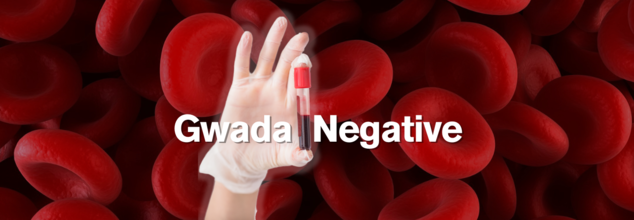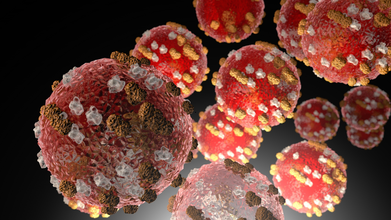- Health Conditions A-Z
- Health & Wellness
- Nutrition
- Fitness
- Health News
- Ayurveda
- Videos
- Medicine A-Z
- Parenting
‘Gwada Negative’: The New Blood Type Discovered In A Woman From Guadeloupe

In a breakthrough that could transform how we understand blood compatibility and genetic mutations, French scientists have identified a new and ultra-rare human blood group, officially recognized as the 48th blood group system in the world. Dubbed "Gwada Negative", the blood type was discovered in a woman from the Caribbean island of Guadeloupe, and to date, she remains the only known person on Earth with this unique genetic profile.
The discovery not only expands the landscape of hematology but also highlights the critical importance of diversity in medical research, rare blood registries, and personalized healthcare.
The journey began quietly in 2011, when a 54-year-old woman undergoing routine pre-surgical testing in Paris presented with an unusual antibody in her blood. Despite efforts, researchers at the French Blood Establishment (EFS) couldn’t find a compatible donor, nor could they classify her blood within existing systems.
At the time, the tools to decode her rare profile weren’t advanced enough. But the case wasn’t forgotten.
By 2019, thanks to breakthroughs in high-throughput DNA sequencing, researchers re-analyzed her sample and discovered a genetic mutation in the PIGZ gene, which plays a role in anchoring proteins to the surface of blood cells. This mutation, inherited from both of her parents, created a completely novel blood group system.
In June 2024, the International Society of Blood Transfusion (ISBT) officially recognized "Gwada Negative" as the world’s 48th blood group system—a milestone that may impact everything from transfusion medicine to maternal-fetal care.
Why This Discovery is Revolutionary?
The implications of discovering a new blood group extend far beyond academic curiosity. Blood group compatibility is a life-or-death issue, especially during transfusions, organ transplants, or pregnancy. Incompatibility can lead to immune reactions, severe complications, or even death.
According to the CDC, approximately 14 million blood transfusions are performed annually in the U.S. alone. While most rely on common blood groups like A+, O−, or AB+, there exists an entire spectrum of rare and ultra-rare blood types that standard testing often misses.
The “Gwada Negative” case emphasizes the need to refine and expand global rare blood registries to include more ethnically diverse populations, especially from regions like the Caribbean, Africa, and South America where underrepresentation in biomedical research is prevalent.
What Makes 'Gwada Negative' Blood Type So Unique?
According to Dr. Thierry Peyrard, the medical biologist at EFS who led the discovery, the blood type was named “Gwada” as a nod to the patient’s Guadeloupean heritage and because the name “sounded good in all languages.”
But the science behind it is no less poetic. The PIGZ gene mutation responsible for this blood type affects how proteins bind to red blood cells—an anomaly not found in any other known human sample.
“She is the only person in the world who is compatible with herself,” Peyrard remarked, underlining the magnitude of the challenge: no blood donor, not even family members, matched her type. In medical terms, this makes her the most transfusion-challenged person alive.
Significance of ' Gwada Negative' for Global Health
As genetic sequencing becomes more accessible and advanced, the pace of discovering new blood groups is accelerating. The discovery of Gwada Negative joins a growing list of rare blood types, adding crucial data to our understanding of hematological diversity and helping us respond better in emergencies involving rare phenotypes.
According to EFS, it has been responsible for identifying 10 of the last 17 blood group systems over the past decade, showing how France has quietly become a global leader in blood science.
“Discovering new blood groups means offering patients with rare blood types a better level of care,” said the EFS in a statement. “It brings hope—especially when seconds count in emergency situations.”
While the discovery of Gwada Negative is historic, the next step is critical: finding others who share this blood group, particularly within populations that may carry similar ancestry or genetic mutations.
Peyrard and his team are working on launching targeted blood donor campaigns in Guadeloupe and among people of Caribbean descent. Their goal is to identify other carriers and potentially build an international rare blood donor registry that includes this newly classified group.
This is especially important for women of childbearing age. If a pregnant woman with a rare blood type produces antibodies against her fetus's blood cells, it can lead to hemolytic disease of the newborn—a serious, and sometimes fatal, complication.
How The New Blood Type Will Impact Rare Diseases and Genetic Research?
The implications of discovering new blood types go beyond transfusions. Mutations like those found in the PIGZ gene may also shed light on other genetic disorders, including those affecting the immune system, neurological conditions, and inflammatory diseases.
“This discovery has not only functional results,” Peyrard noted. “It allows for a better understanding of pathologies.”
In the future, understanding blood types at a molecular level could even lead to personalized cancer therapies or targeted drug development for rare conditions.
Wegovy Pill: FDA Says The TV Ad By Novo Nordisk On Its Weight Loss Pills Are Misleading

Credits: Canva
Wegovy pill by Novo Nordisk is now under scrutiny after the US Food and Drug Administration (FDA) raised concerns over a television advertisement. FDA said that the commercial includes "false and misleading" claims about the obesity drug's benefits.
In a letter (reported first by Bloomberg) dated February 5, the FDA said the advertisement misbrands the oral weight loss drug. FDA said that it made its distribution a potential violation of federal law. FDA has asked the Danish drugmaker to take immediate corrective action, which include:
- Pulling the ad
- Revising all advertisements that contain misleading statements
Wegovy Pill: FDA Questions Claims of Superiority and Emotional Benefits
As per the letter, the FDA found that the ad misleadingly suggests the Wegovy pill offers superior benefits when compared to other approved GLP-1 weight loss drugs. The regulator flagged phrases such as “live lighter” and “a way forward,” saying they imply greater weight loss and added advantages without evidence to support those claims.
The FDA also took issue with what it describes as emotional and psychological messaging, saying that the ad appears to imply benefits beyond physical weight loss, including emotional relief, reduced psychological burden, hope, or direction in life. FDA notes that this claim positions the drug as a solution to broader life challenges rather than just a treatment to obesity.
Furthermore, FDA said that the ad failed to adequately present risk information in both audio and text formats, which is mandatory requirement for television drug advertising.
Wegovy Pill: Novo Nordisk Responds To FDA Notice
Novo Nordisk confirmed on Monday that it has received the FDA’s letter. The company clarified that while the advertisement has been running since the pill’s launch, it is not linked to its Super Bowl advertising.
“We take all regulatory feedback seriously and are in the process of responding to the FDA to address their concerns regarding the advertisement’s presentation,” said Liz Skrbkova, Novo Nordisk’s head of US media and stakeholder relations, in a statement.
Novo Nordisk is already under pressure to defend its position in the weight loss market, as it is facing a stiff competition from rival Eli Lilly. Furthermore, on Monday, Novo also filed a lawsuit against telehealth company Hims & Hers, seeking to block the mass marketing of compounded versions of its Wegovy pill and injections.
Read: Wegovy Pills Now Available At Your Pharmacies, Here's What To Know About Its Usage
Wegovy Pill: How Effective Is It?
After injection by Novo Nordisk, of the same name, Wegovy, which has been on the market since 2021, its popularity grew so much that it was in short supply until February 2025. The pill version has now come out, which many experts believe will expand its accessibility. As the monthly supply of pill is expected to be cheaper than the monthly supply of the weight loss injection.
A study published in the New England Journal of Medicine show that a 25 milligram Wegovy pill led to 13.6% reduction in weight on average over 64 weeks. When compared to placebo, the result was only 2.2% of weight loss. Novo Nordisk says that those who stayed on the treatment and reduced their calorie intake, it would lead to a loss of 16.6% of their weight.
Wegovy Pill: What Are The Side Effects?
Digestive problems such as nausea and vomiting remain the most common side effects of GLP-1 drugs. These issues were also reported in studies of the pill versions. Around 7 percent of participants taking the Wegovy pill stopped treatment because of side effects, compared with 6 percent in the placebo group. In orforglipron’s trial, up to 10 percent of patients discontinued treatment, compared with 3 percent on placebo.
One key difference lies in how the medications are used. The Wegovy pill must be taken on an empty stomach with a small amount of water. Patients are advised not to eat, drink, or take other medicines for at least 30 minutes afterward. Doctors say this requirement has limited the use of Rybelsus, the pill form of semaglutide approved for diabetes, compared with Ozempic.
Epstein Files Raise Questions About Trump’s Memory Decline

Credit: Canva
Two years before Jeffrey Epstein killed himself in his New York jail cell, he claimed that US President Donald Trump may be suffering from dementia.
The United States Department of Justice recently released more of the harrowing Epstein Files that lift the lid on years' worth of horrific crimes committed by the convicted American child sex offender, serial rapist and human trafficker.
Among the files, eagle eyed readers found an email sent to journalist and Trump biographer Michael Wolff on Dec. 29, 2017, where Epstein claimed that Trump has begun showing signs of memory loss during his first presidency after he failed to recognize some of his own friends.
In the email to the Landslide author, the convict wrote: "Some at dinner with donald last night, were concerned about dementia. tons of makeup. did not recognize old friends.”
And Epstein isn't alone. Former White House chief strategist and Trump associate, Steve Bannon allegedly believed the president had "early-stage dementia," according to former 60 Minutes producer Ira Rosen’s book Ticking Clock.
Bannon claimed that Donald “had no attention span, didn't read, and now doesn't listen. He said Donald repeats himself a lot, telling the same story minutes after he told it before," per Rosen's account, which the former chief strategist later denied.
The producer also claimed in the book that “Bannon tried to build support to have Trump removed” from office due to his concerns.
Family Members Say Trump Has Dementia
Mary Trump, a well-known critic of her uncle who frequently speaks about him on her YouTube channel, has implied that he could be suffering from Alzheimer's disease, noting similarities to her late grandfather, who also suffered from the neurodegenerative disease.
As per UK Express, Mary highlighted that she has seen resemblances to Fred Trump, Donald's late father and former real estate magnate, who battled Alzheimer’s before passing away in 1999 at the age of 93.
Speaking last year, Mary recounted witnessing her grandfather’s decline and suggested that Donald sometimes doesn’t seem “oriented,” pointing to a particular look. Talking about her grandfather, she told New York Magazine: "One of the first times I noticed it was at some event where he was being honored. And I looked at him and saw this deer-in-the-headlights look, like he had no idea where he was."
In further remarks, Mary said she now notices what the publication described as “flashes” of her grandfather in her uncle when she sees him on stage, pointing out the same “deer-in-the-headlights” expression.
She added: "Sometimes it does not seem like he's aware of time or place. And on occasion, I do see that deer-in-the-headlights look."
Trump Rejects Memory Loss Claims
Despite multiple reports, Trump and his team have consistently rejected such claims, noting that he has “aced” three cognitive tests and there is no possibility of him having Alzheimer's disease.
In a conversation with the New York Magazine, Trump also reflected on his father’s diagnosis: "He had one problem. At a certain age, about 86, 87, he started getting what do they call it?"
His press secretary, Karoline Leavitt, supplied the term for Trump, who referred to it as an “Alzheimer’s thing,” asserting that he did not “have it.” The health of the 79-year-old has been the subject of much public speculation recently, with observers noting bruises on his hands, what appear to be swollen ankles, and rambling speech.
READ MORE: New FDA Approved Blood Test Can Predict Alzheimer’s Disease Before Symptoms Appear
What Is Alzheimer’s Disease?
Alzheimer's disease is one of the most common forms of dementia and mostly affects adults over the age of 65.
About 8.8 million Indians aged 60 and above are estimated to being living with Alzheimer's disease. Over seven million people in the US 65 and older live with the condition and over 100,00 die from it annually.
Alzheimer's disease is believed to be caused by the development of toxic amyloid and beta proteins in the brain, which can accumulate in the brain and damage cells responsible for memory.
Amyloid protein molecules stick together in brain cells, forming clumps called plaques. At the same time, tau proteins twist together in fiber-like strands called tangles. The plaques and tangles block the brain's neurons from sending electrical and chemical signals back and forth.
Over time, this disruption causes permanent damage in the brain that leads to Alzheimer's disease and dementia, causing patients to lose their ability to speak, care for themselves or even respond to the world around them.
While there is no clear cause of Alzheimer's disease, experts believe it can develop due to genetic mutations and lifestyle choices, such as physical inactivity, unhealthy diet and social isolation.
Early symptoms of Alzheimer's disease include forgetting recent events or conversations. Over time, Alzheimer's disease leads to serious memory loss and affects a person's ability to do everyday tasks.
There is no cure to this progressive brain disorder and in advanced stages, loss of brain function can cause dehydration, poor nutrition or infection. These complications can result in death.
Measles In DC: Health Officials Warn of Possible Exposure After National March for Life Events

Credits: Canva
Health officials in Washington, D.C. are warning that confirmed cases of measles may have spread during this year’s National March for Life rally and related events held in the capital late January. The annual anti-abortion gathering drew thousands of people to the National Mall and surrounding areas, raising concerns about potential large-scale exposure.
The D.C. Department of Health said it is actively working to identify individuals who may be at risk after learning that several people who later tested positive for measles were present in the city while contagious.
“DC Health was notified of multiple confirmed cases of measles whose carriers visited multiple locations in the District while contagious,” the agency said in a statement on Sunday. Officials are now contacting people who were at those locations during the exposure window.
Measles In DC: Transit Hubs and Campuses Among Exposure Sites
According to DC Health, potential exposure sites span a wide range of busy public locations between January 21 and February 2. These include Ronald Reagan Washington National Airport, Union Station, an Amtrak Northeast Regional train, and multiple stops within the city’s Metro subway system.
Health officials also flagged visits to the Basilica of the National Shrine of the Immaculate Conception and Catholic University as part of the exposure timeline. Given the volume of visitors moving through these spaces daily, authorities say the risk of wider spread cannot be ruled out.
Measles In DC: Hospital Issues Public Health Notice
Children’s National Hospital has also issued a public health notice after a confirmed measles patient from Virginia visited its Emergency Department on February 2 while infectious. The hospital said it is coordinating with public health authorities to identify and notify anyone who may have been exposed during that time.
Measles is highly contagious and can remain airborne for up to two hours after an infected person leaves an area, making hospital settings particularly vulnerable.
Measles In DC: Surge Across the United States
The situation in Washington comes as the United States faces its largest measles outbreak in decades. According to the Centers for Disease Control and Prevention, 733 confirmed cases have been reported across 20 states so far this year. The CDC says about 95 percent of those cases involve people who were unvaccinated or whose vaccination status is unknown.
South Carolina remains one of the hardest-hit states. Its outbreak began in October 2025 and has now surpassed earlier outbreaks elsewhere in the country. State health officials reported 44 new cases on Friday, bringing the total to 920. While the pace of new cases has slowed slightly, officials continue to warn of possible exposure at public places such as a Target store in Taylors and a Social Security Administration office in Spartanburg, where the outbreak is centered.
Measles In DC: Vaccination Urged Amid Global Concern
Speaking on CNN’s State of the Union, Centers for Medicare and Medicaid Services Administrator Mehmet Oz urged Americans to get vaccinated against measles. While recent federal policy changes have rolled back recommendations for some vaccines, guidance on measles immunization remains unchanged.
International health authorities are also watching closely. The World Health Organization’s Pan American Health Organization has invited U.S. officials to a meeting in April to review the country’s measles elimination status, which is now under threat.
D.C. health officials are urging anyone who may have been exposed and is not fully vaccinated, pregnant, or immunocompromised to contact a healthcare provider immediately.
© 2024 Bennett, Coleman & Company Limited

